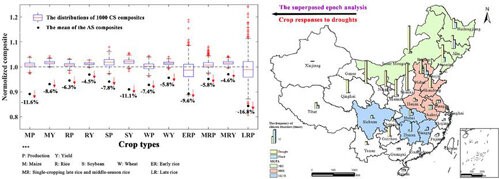
Climate disasters have disrupted food production and caused yield losses in recent decades. These disasters have threatened food security at both local and global scales. Quantitative identification of the impacts of climate disasters on crop yields and production is conducive to ensuring food security and formulating effective measures to deal with climate disasters.
In the past, crop models and statistical models were mostly used in research, and could well separate the impact of climate change on the yield and production of different crops. However, both models extensively used the climatic indices (such as extreme temperature and extreme precipitation) to identify the relationship between crop yield and climate disasters, and the impact of extreme weather disasters on crop yield and production cannot be completely separated.
Considering the limitations of crop models or statistical models, Prof. Shi Wenjiao's team at Institute of Geographic Sciences and Natural Resources Research of Chinese Academy of Sciences defined the actual-occurred composited series (AS) and control composited series (CS), and quantitatively separated the losses of yield and production of the major grain crops (maize, rice, soybean, and wheat) resulting from droughts and floods across China and major grain-producing areas (MGPA) during 1982–2012 using the superposed epoch analysis (SEA) method, which is suitable for analyzing the losses of crop yield and production caused by climatic disasters such as droughts and floods.
The research showed that between 1982 and 2012, various responses of droughts and floods were found for main crops; specifically, responses varied throughout China, and among the three MGPA.
The flood disaster reduced the yield and production of major crops by 4.4-6.8%, while the impact of drought disaster was significant and widespread, with the yield loss of major crops being 4.5–11.6%, especially maize and soybean, with the yield and production decreasing by 7.8–11.6%. Wheat yield was affected by both droughts and floods, with significant decreases of 5.8% and 6.1%, respectively.
Click here to see more...